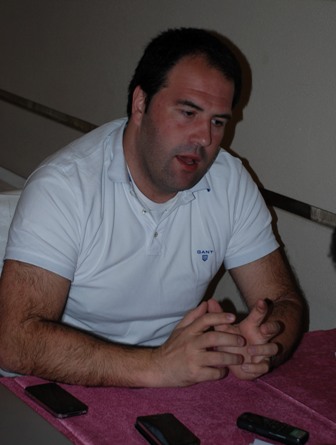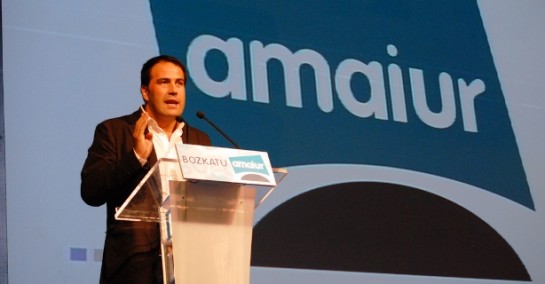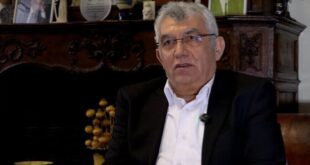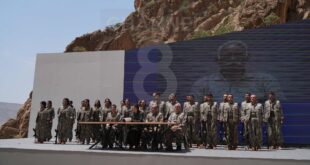Interview of Infowelat with Basque independentist EH Bildu’s member Jon Inarritu Garcia. He was a member of Spanish Parliament between 2011-2015 and he is currently a member of Spanish Senate for the same party.
Necat Ayaz: Why Basque leftist nationalist political forces have been unsuccessful to create a strong party or a platform while traditional nationalist PNV has continued its political influence as the ruling party?
Jon Inarritu: We have discussed different matters and have found different solutions and so we have been broken up to many parties in the past. Two years ago, we discussed the subject of divisions among us and we created EH Bildu to become a strong alternative in Basque Country. Finally, in the elections took place in 2014, we obtained good results and we closed to PNV. The name of our election coalition for general elections was Amaiur. In the general elections we were able to send Spanish Parliament 7 members from Basque Country and Navarra while PNV was able to send 5. It was the first time that we took more chairs than PNV. Thanks to this collaboration, we are the second force in Basque Country and we can be an alternative. This fact makes PNV nervous. We also take more votes than this party in Gipuzkoa province where we have strong presence. And the reason for this collaboration is the permanent cease-fire that was declared by ETA. We have been against the violence and the cease-fire made easy to form this coalition. Currently, we are discussing to take part in general election under the umbrella of EH Bildu.
Necat Ayaz: Apart from Basque Country, where do you present candidates in the elections for Spanish Parliament?
J. Inarritu: In Spain we have two Basque territories namely Autonomous Community of Basque and Autonomous Community of Navarra. We just go to elections in these two territories. We never go to elections in other regions in Spain.
Necat Ayaz: How are political forces under the roof of Eh Bildu are organized and work in Basque Country? Do they just use parliamentarian mechanisms?
J. Inarritu: As we are the leftist party and we are very critical of the system, we use some mechanisms of direct democracy for organization and work. Until now we have create many assemblies in the towns and villages open the people to decide about the subjects that are important for them. Also in some municipalities there is the option to approve a part of budget. We have carried out a lot of referendums to consult people about the issues important for them. These assemblies are temporary in character and are took place in every center that the municipality is in our hands. All of the citizens are allowed to take part to these meetings and to speak and propose about management economy, recycling methods and recollection of litters. In local level, many referendums have been carried out to ask the people’s opinion regarding political, economical and cultural matters. But sometimes we have had some difficulties to do that as we have not majority in Basque Country. On the other hand, Spanish government has not allowed us to hold referendums about construction of roads, bridge and etc. We have done a good job in our municipalities than the PNV’s work in their municipalities. For example, in Gipuzkoa we have been very successful in management of the local administrations and we collected more taxes than the other local administrations in the time of the crisis.

Necat Ayaz: When and how Aralar was created? What are the differences between it and the other members of EH Bildu?
J. Inarritu: Some years ago we began to discuss to leave the Abertzale which was offspring of Herri Batasuna. Before this time, ETA had broken the cease-fire and we thought that it was a huge mistake. Basque society didn’t want any more violence and asked for peace forever. This is the main reason why we left Abertzale. Apart from this, we had big differences from the Abertzale which is now called Sortu. We said that a militant has to be member of the party. We demanded that the decisions must have been taken democratically and so we defended one member one vote principle to prevent the influential persons and secret decision-taking process. On the other hand, despite they used to be elected for Basque and Spanish parliaments, they used to reject to work in these institutions claiming that they were not our own institutions. We claimed that we didn’t want to be part of Spain but we had to participate every institution to defend our struggle and we also see the Basque institutions as our own institutions. And at the end, they began to understand that we defended the true position and they did the same like us.
Necat Ayaz: Why current autonomy which is seen as one of the most extensive autonomy in Spain and Europe, does not satisfy your party and other independentists?
J. Inarritu: There have been nearly 30 powers that have not been transferred to Basque Autonomous Region since 35 years. So Spanish state has not fulfilled its responsibilities regarding the Basque Statute of Autonomy. We also want to permanent representation in European Council to defend the Basque fiscal system and economical interests in European level. Apart from this, we demand our language is to be recognized as an official language in European Parliament. So, despite its positive consequences in the area of political representation, economy, culture and language, the current statute of Basque people inside Spain does not satisfy us. At the end, the Basque society wants to decide whether it defends free association with Spain, to create its own state or to continue as a autonomous region. People have not the right to decide for its future freely.
Necat Ayaz: Don’t you think that it is a contradiction while in one hand you want a sovereign state and on the other hand you want to participate EU where the much of the power have been collected at the hands of the Brussels?
J. Inarritu: You know there were two wars in last century in Europe and in the past states had always fought against other states. Since the Second World War, there have not been major wars between states in Europe and more or less the peace has been carried out. The countries of EU are democratic and human rights are respected though sometimes there are some problems. But human rights situation are effectively controlled by EU mechanisms. We also have seen that Spain has gained much from the participation of EU as a full member. On the other hand, EU administration presents a bad experience during the economic crisis. The main decisions are taken by Troika which is consisted of European Commission, European Central Bank and International Monetary Found during the time of crisis. We are very critical about this situation and we want another EU. And also it should be said that some countries inside EU which are economically strong has much influence on the important decisions. So we defend the values of Europe and want to become a full member but we also demand a more social Europe where every country are equal.
Necat Ayaz: What is your opinion about Plan Ibarretxe which proposed free association of Basque Country with Spain? After this plan, has there been any big initiative for sovereignty in Basque Country?
J. Inarritu: I respect this plan but I don’t defend a free association between Basque and Spain. Because I don’t trust Spanish government. To me it is better to create a Basque state. The Ibarretxe Plan can be seen as a step on the way of Basque independence. Basque President said that you could not go to the summit of Everest Mountain with one step. Instead you go from a camp to other camp on the way towards summit. So this plan could be considered as step towards the complete independence. When this plan was rejected by Spanish government without consulting us, again it was clear to us that there was no solution except total independence. PNV declared that it will start a new initiative for sovereignty in Basque in 2015. There are 75 parliaments in Basque Parliament and 48 of them are Basque nationalists and that is enough to start this process in the parliament. And I think that a similar process like in Catalonia can be start in Basque Parliament.
Necat Ayaz: Despite unilateral cease-fire and ETA’s intention to disarm at the presence of international mediators, Spanish government rejected to support this process. Without state backing and willingness, can the peace process in Basque Country be successful?
J. Inarritu: It is clear that Spanish state prefers some violence because it is state and states are always powerful. For this reason, it ignores ETA’s intention to stop the armed struggle and complete disarm. ETA just said it would lay down the arms in the presence of international mediators and wanted a solution to be found for its political prisoners. If you have political conflict without violence you have to solve it by political means. Spain knows that if ETA disappears it has to listen to the demands of Basque society and confront to these democratic demands. According to Spanish state, everything about Basque question is related with ETA. Because of this reason, Spanish state still continues its old policy and rejects to meet with international mediators. Imagine that Turkey has met with PKK but Spain rejects to have dialogue with ETA. So, currently Spain is worst than Turkey.
Basque society wants to see the end of violence and so the process has to continue. ETA is very serious to disarm and for this reason it works with international mediators. Its decision to disarm is without condition. As the violence has come to an end in Basque Country, now we discuss consequences of the violence. For example, the situation of Basque prisoners whose numbers exceed 600 is one of the topic that we discuss nowadays. So the process has to continue.
Amed
 Infowelat Enformasyon Ji Bo Welat
Infowelat Enformasyon Ji Bo Welat




